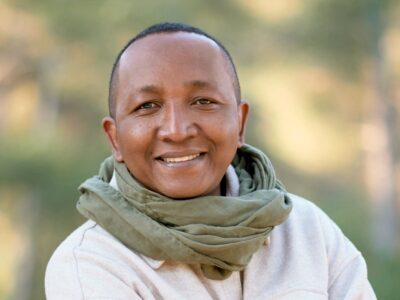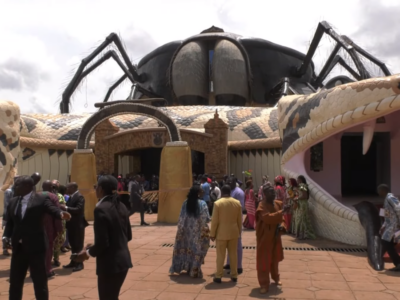
Mpandihy sy mpitendry amponga nentim-paharazana ao Zimbaboe. Sary avy amin'i TJ Maposhere tao amin'ny Wikimedia Commons (CC BY-SA 4.0).
Fanamarihan'ny tonian-dahatsoratra: Manomboka amin'ny 13-19 aprily 2021, handray ny kaonty Twitter ifandimbiasana @DigiAfricanLang i Blessing Sibanda, izay manadihady ny fomba fampiasana ny teknolojia hamelomana ireo fiteny Afrikana. Vakio bebe kokoa ato ny momba ny fanentanana.
Shona, fiteny ofisialin'i Zimbaboe, dia iray amin'ny fiteny Bantu be mpiteny indrindra, manana mpiteny tombanana eo amin'ny 10,8 tapitrisa eo. Saingy na dia misy aza ireo loharanom-pahalalana literatiora sy ara-tantara marobe napetraka amin'ny Shona, tsy dia mahafa-po mihitsy ny fahitana ny fiteny an-tserasera.
Blessing Sibanda, injenieran'ny rindrambaiko, no lohalaharana amin'ny ezaka hananana ny teny Shona ho ankatoavina eo amin'ny sehatry ny fikirakirana ny fiteny voajanahary, ny sehatry ny faharanitan-tsaina artifisialy mba hahatonga ny solosaina “hahatakatra” sy hamaky ny fiteny voasoratra sy tenenina.
Niresaka tamin'i Blessing i Adéṣinà Ọmọ Yoòbá avy ao amin'ny Rising Voices mba hahalalana bebe kokoa momba ny asany amin'ny fahazoana fankatoavana ny fiteny Shona amin'ny milina fianarana tokotanin-tsehatra sy an-jotra.
Adéṣinà Ọmọ Yoòbá (AOY): Azonao atao ve ny milaza aminay ny momba anao?
Blessing Kudzaishe Sibanda. Image used with his permission.
Blessing Kudzaishe Sibanda (BKS): My name is Blessing Kudzaishe Sibanda. I am a software engineer and researcher. I am currently pursuing a Master’s degree in Computer Science at Namibia University of Science and Technology. My research interests are in Computer Vision and natural language processing (NLP).
I am part of Masakhane, where I am conducting NLP research on low-resource languages, specifically concentrating on my native language Shona. I have been particularly involved in the machine translation and named-entity recognition (NER) initiatives for Shona.
Blessing Kudzaishe Sibanda (BKS): Blessing Kudzaishe Sibanda no anarako. Injenieran'ny rindrambaiko sy mpikaroka aho. Manaraka fianarana mari-pahaizana Master momba ny Siansa Informatika ao amin'ny Oniversite Siansa sy ny Teknolojia Namibia aho izao. Ny tanjoko amin'ny fikarohana dia ny Fahitana momba ny Solosaina sy ny fanodinana ny teny voajanahary (NLP).
Izaho dia anisan'ny Masakhane, izay itarihako fikarohana NLP momba ireo fiteny vitsy voambolana, mifantoka manokana amin'ny tenindrazako Shona. Nandray anjara manokana tamin'ny fandikan-teny amin'ny milina sy ny fisantarana andraikitra fankatoavana singa nomena anarana (NER-ang) ho an'ny Shona aho.
AOY: Manao ahoana ny toerana ankehitriny misy ny fiteninao ivelan'ny aterineto sy an-jotra?
BKS: Shona is very active and vibrant offline. According to the website mustgo, it is one of the most spoken Bantu languages, with an estimated 10.7 million speakers. It has a rich history and literature with a lot of a documentation. Although it has great resources offline, there still a lot potential to increase its presence online.
BKS: Mavitrika tokoa ary mavitrika ivelan'ny aterineto ny Shona. Araka ny tranokala mustgo, iray amin'ireo fiteny Bantu be mpiteny indrindra izy io, ary tombanana ho 10,7 tapitrisa ny mpampiasa azy. Manana tantara sy literatiora manan-karena fanadihadiana maromaro izy. Na dia manana loharano lehibe ivelan'ny aterineto aza izy, dia mbola betsaka ny azo atao hampitomboana ny fisiany amin'ny aterineto.
AOY: Inona araka ny hevitrao no fanamby lehibe atrehin'ny vondrom-piarahamonin'ny fiteninao amin'ny resaka fifandraisana nomerika na famoronana votoaty nomerika amin'ny tenin-drazan'izy ireo?
BKS: I think in most African countries, inclusive of my country, the biggest challenge is that of having the language of the former colonisers as the first language. Although this has been of advantage when communicating on an international stage, it has made our own native languages not be appreciated as they should. This has to some extent made those who speak for example English be thought of as more educated or of a higher social class whilst looking down upon our own native languages. So, you find people preferring the foreign language more than the native one.
With this, I think the biggest issue which needs to be dealt with is the perspective of the native language, it needs to be shifted to make it more appealing to use whether in business or on the internet, so that people can better embrace it. From a technological standpoint, it is lagging behind in terms of tools and software which make it easier and accessible to use online. This is mostly because of the lack of resources which can be used to produce those tools. Tools and services like dictionaries, translation, keyboards (for languages with diacritics), speech, amongst others, will pay off in the long run as they make it easier to communicate with our own language online.
BKS: Heveriko fa any amin'ny ankamaroan'ny firenena Afrikana, anisan'izany ny fireneko, ny fanamby lehibe indrindra dia ny fananana ny fitenin'ireo mpanjanatany taloha ho fiteny voalohany. Na dia tombontsoa aza ity rehefa nifampiresaka teo amin'ny sehatra iraisam-pirenena, dia nahatonga ny tenindrazanay tsy nankatoavina araka ny tokony ho izy. Nahatonga ny fiheverena ireo izay miteny Anglisy ho toy ny avara-pianarana kokoa na sarangam-piarahamonina ambonimbony kokoa izany no sady manambany ny fitenin-drazanay manokana. Ka noho izany, mahita ianao fa mora kokoa ny miteny vahiny toy izay ny anao teratany.
Amin'izany, heveriko fa ny olana lehibe indrindra tokony hovahana dia ny fomba fijery ny tenin-drazana, mila ovaina izany mba hahatonga azy ho mahasarika kokoa ny fampiasana azy na amin'ny varotra na amin'ny aterineto, mba hahafahan'ny olona mandray azy tsara kokoa. Raha ny fomba fijery ara-teknolojia, dia taraiky izy amin'ny lafiny fitaovana sy rindrambaiko izay manamora kokoa azy sy azo idirana hampiasaina anjotra. Ny ankamaroany dia noho ny tsy fahampian'ny loharano azo ampiasaina hamokarana ireo fitaovana ireo. Hisy vokatsoa maharitra ireo fitaovana sy servisy toy ny rakibolana, fandikan-teny, kitendry (ho an'ireo fiteny misy diakritika), ny kabary, ankoatra ny hafa, satria manamora ny fifandraisana amin'ny fiteninay manokana amin'ny aterineto izy ireo.
AOY: Araka ny hevitrao, inona ny sasany amin'ireo dingana azo raisina ao anatin'ny fotoana fohy handrisihana ny fitomboan'ny fampiasana ny fiteny amin'ny aterineto?
BKS: I believe the integration of local languages into everyday online tools and technologies that we use can encourage the increased use of the language on the internet. For example, with Google Search, if you could switch the main language to Shona and everything gets displayed in Shona. This should also be the option for social media sites, where most of the languages from Africa are not covered for personalising display language.
Another example is with Wikipedia. People can contribute pages using their own native languages which in a way increases the discoverability of these languages. I believe another step, as earlier noted, is investment in research and products which utilize native languages.
From a technological perspective, there is a lot of ground to cover compared to the most widely spoken languages to be at par in terms of research and products. This is an impediment, as we cannot fully express our own language whilst making those unfamiliar with it able to understand it, as the internet has made the world a global village. With these concerted efforts I believe the use of native languages online can be encouraged.
BKS: Mino aho fa ny fampiatiana ireo fiteny eo an-toerana ao anatin'ny fitaovana sy teknolojia an-tserasera isan'andro izay ampiasainay dia afaka mandrisika ny fitomboan'ny fampiasana ny fiteny amin'ny aterineto. Ohatra, amin'ny Fikarohana Google, raha azonao atao ny mamadika ny fiteny lehibe ho Shona ary azo aseho amin'ny Shona ny zava-drehetra. Tokony ho io ihany koa no safidy ho an'ireo tranonkala media sosialy, izay tsy ananan'ny fiteny avy aty Afrika fisehoan'ny fiteniny manokana.
Ohatra iray hafa ny amin'ny Wikipedia. Afaka mandray anjara amin'ny fampiasana ny fitenin-drazany ny olona izay mampitombo ny fahitana ireo fiteny ireo. Mino aho, araka ny efa nomarihiko teo aloha, fa dingana iray hafa, ny fampiasam-bola amin'ny fikarohana sy ny vokatra izay mampiasa ny tenin-teratany.
From a technological perspective, there is a lot of ground to cover compared to the most widely spoken languages to be at par in terms of research and products. This is an impediment, as we cannot fully express our own language whilst making those unfamiliar with it able to understand it, as the internet has made the world a global village. With these concerted efforts I believe the use of native languages online can be encouraged.
Raha ny fijery teknolojika, dia betsaka ny tany mila sahanina raha oharina amin'ireo fiteny be mpampiasa indrindra raha te ho ao anatin'ny voambolam-pikarohana sy vokatra. Sakana izany satria tsy afaka maneho feno ny fiteninay izahay no manao izay hahatakaran'ny tsy zatra azy, satria nanao izao tontolo izao ho vohitra iray manerantany ny aterineto. Amin'ireto ezaka ifarimbonana ireto, mino aho fa azo ampirisihina ny fampiasana ny tenindrazana an-tserasera.
AOY: Inona no antony manosika anao voalohany hiasa hahita ny fiteninao sy ny kolontsaina ho hita amin'ny aterineto?
BKS: My motivation is to see a lot of activity when it comes to NLP technologies for Shona, and to have tools that are comparable in performance to the widely adopted languages on the internet. I believe competent tools will inevitably encourage the use of the language on the internet, and for this to happen the native speakers should be at the forefront of researching and producing these tools as they better understand their own language.
This is why I adore and am part of the Masakhane Community. It is bringing the native speakers to work and research on their own languages. It is lowering the barrier of entry into working with these technologies, providing a community and mentors to help along this journey of producing these tools. In addition to this, it is publishing research which will make it easier for others to continue this work and make sure native languages are represented in technology.
BKS: Ny antony manosika ahy dia ny mahita hetsika marobe rehefa miresaka momba ny teknolojia NLP ho an'ny teny Shona, ary ny fananana fitaovana azo ampitahaina amin'ny fampisehoana ireo fiteny ampiasaina indrindra amin'ny aterineto. Mino aho fa handrisika ny fampiasana ny fiteny amin'ny aterineto ny fitaovana mahavita izany, ary mba hitrangan'izany dia tokony ho lohalaharana amin'ny fikarohana sy famokarana ireo fitaovana ireo ny mpiteny teratany satria mahatakatra tsara kokoa ny fiteniny manokana izy ireo.
Izany no antony ankafiziko sy anisan'ny maha-fiarahamonina Masakhane ahy. Mitondra ireo mpiteny teratany hiasa sy hikaroka momba ny fitenin'izy ireo manokana izany. Mampihena ny sakana hidirana amin'ny fiaraha-miasa amin'ireo teknolojia ireo, manome vondrom-piarahamonina sy mpanolo-tsaina hanampy mandritra ny dia amin'ny famokarana ireo fitaovana ireo. Ho fanampin'izany, dia mamoaka fikarohana izay hanamora ny fanohizan'ny hafa ity asa ity izany ary hahazoana antoka fa voasolotena amin'ny teknolojia ny tenin-teratany.








